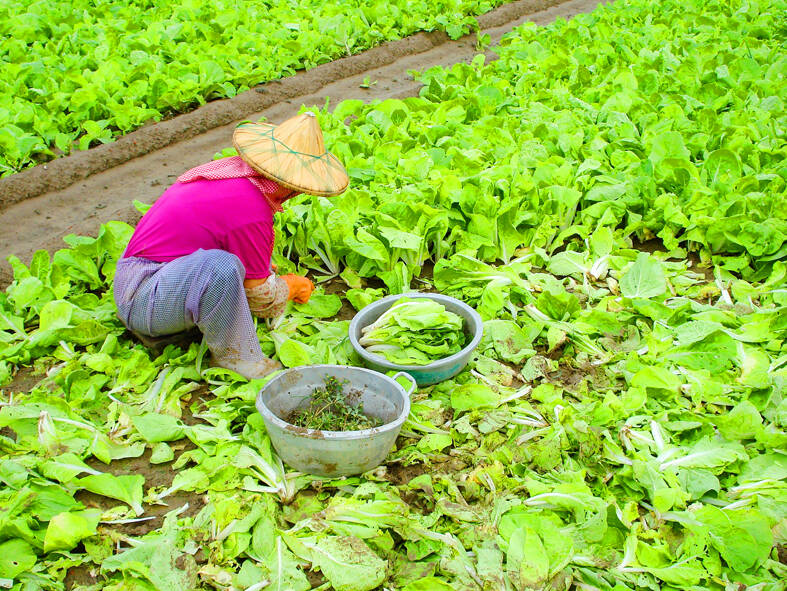The government has 143 food distribution stations around the nation and supply chains that are “fully planned” in the event of an emergency such as an invasion by China, Minister of Agriculture Chen Junne-jih (陳駿季) said on Wednesday.
Chen also during a legislative hearing said that Taiwan “currently has five-and-a-half months of public grain reserves” which could increase to “about eight or nine months if [this year’s] harvest is good.”
The state-run reserves “usually last from eight to 12 months,” but Taiwan also has private grain reserves, which means at present the nation’s food needs could be met for a year, he said.

Photo: Yeh Yung-chien, Taipei Times
The distribution process is a collaboration between central and local governments, although the central government “would not directly” handle food distribution in a national emergency, Chen added.
While there are 143 stations, not every county or city requires one, since food distribution plans are not based on those administrative divisions, Chen said.
The Ministry of Agriculture (MOA) would provide more detailed information on food distribution plans as part of ongoing preparations for emergency scenarios, including war and natural disasters, he said.
The minister was responding to concerns raised by Chinese Nationalist Party (KMT) Legislator Weng Hsiao-ling (翁曉玲), who cited a report from the Center for Strategic and International Studies on Taiwan’s food security.
The US think tank report said that a Chinese blockade could “at any time” prevent ships from reaching Taiwan, which imports 70 percent of its food and 96 percent of its energy, Weng said.
On Oct. 14 last year, for instance, the China’s military conducted large-scale drills around Taiwan that, according to the Chinese People’s Liberation Army, focused on capabilities including “the blockade and control of key ports and areas.”

Taiwan has received more than US$70 million in royalties as of the end of last year from developing the F-16V jet as countries worldwide purchase or upgrade to this popular model, government and military officials said on Saturday. Taiwan funded the development of the F-16V jet and ended up the sole investor as other countries withdrew from the program. Now the F-16V is increasingly popular and countries must pay Taiwan a percentage in royalties when they purchase new F-16V aircraft or upgrade older F-16 models. The next five years are expected to be the peak for these royalties, with Taiwan potentially earning

STAY IN YOUR LANE: As the US and Israel attack Iran, the ministry has warned China not to overstep by including Taiwanese citizens in its evacuation orders The Ministry of Foreign Affairs (MOFA) yesterday rebuked a statement by China’s embassy in Israel that it would evacuate Taiwanese holders of Chinese travel documents from Israel amid the latter’s escalating conflict with Iran. Tensions have risen across the Middle East in the wake of US and Israeli airstrikes on Iran beginning Saturday. China subsequently issued an evacuation notice for its citizens. In a news release, the Chinese embassy in Israel said holders of “Taiwan compatriot permits (台胞證)” issued to Taiwanese nationals by Chinese authorities for travel to China — could register for evacuation to Egypt. In Taipei, the ministry yesterday said Taiwan

Taiwan is awaiting official notification from the US regarding the status of the Agreement on Reciprocal Trade (ART) after the US Supreme Court ruled US President Donald Trump's global tariffs unconstitutional. Speaking to reporters before a legislative hearing today, Premier Cho Jung-tai (卓榮泰) said that Taiwan's negotiation team remains focused on ensuring that the bilateral trade deal remains intact despite the legal challenge to Trump's tariff policy. "The US has pledged to notify its trade partners once the subsequent administrative and legal processes are finalized, and that certainly includes Taiwan," Cho said when asked about opposition parties’ doubts that the ART was

If China chose to invade Taiwan tomorrow, it would only have to sever three undersea fiber-optic cable clusters to cause a data blackout, Jason Hsu (許毓仁), a senior fellow at the Hudson Institute and former Chinese Nationalist Party (KMT) legislator, told a US security panel yesterday. In a Taiwan contingency, cable disruption would be one of the earliest preinvasion actions and the signal that escalation had begun, he said, adding that Taiwan’s current cable repair capabilities are insufficient. The US-China Economic and Security Review Commission (USCC) yesterday held a hearing on US-China Competition Under the Sea, with Hsu speaking on